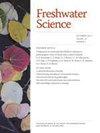温度和光照对日本溪流生态系统代谢的影响
IF 1.6
4区 环境科学与生态学
Q3 ECOLOGY
引用次数: 0
摘要
生态系统代谢是通过系统中所有生物对碳的固定和矿化来控制生物地球化学碳循环的基本过程;然而,在溪流和河流中,生态系统代谢对光照和温度变化的功能反应仍然未知。在这项研究中,我们通过监测溶解氧的季节性昼夜变化,评估了温度和光照对日本溪流生态系统代谢的影响,即总初级生产力(GPP)和生态系统呼吸(ER)。我们发现,ER(0.48eV)的代谢温度依赖性高于GPP(0.39eV),用活化能表示,这支持了生态学的代谢理论。每日GPP和ER都随着每日综合光合有效辐射(标准杆数)的增加而增加,在中等标准杆数值时达到峰值,在较高的辐照度水平时降低。每日GPP和标准杆数之间的这种单一模式关系是由于凌晨瞬时标准杆数的快速增加,抑制了特定区域生产力的最大速率,而这是每日GPP的主要决定因素。此外,在本研究流中,每日GPP和ER密切相关,导致每日ER与每日综合标准杆数呈单一模式。我们的研究结果表明,温度和光照都调节着溪流生态系统的新陈代谢,但阳光状况(即清晨太阳辐照度的快速增加)而不是光照强度本身可能是研究溪流中GPP和ER的关键因素。本文章由计算机程序翻译,如有差异,请以英文原文为准。
The effects of temperature and light on ecosystem metabolism in a Japanese stream
Ecosystem metabolism is a fundamental process that governs biogeochemical C cycling through the fixation and mineralization of C by all the organisms in a system; however, the functional responses of ecosystem metabolism to light and temperature variability remain unknown in streams and rivers. In this study, we assessed the effects of temperature and light on ecosystem metabolism, namely gross primary production (GPP) and ecosystem respiration (ER), in a Japanese stream by monitoring the seasonal diel changes in dissolved oxygen. We found that the temperature dependence of metabolism, which is expressed as activation energy, was higher for ER (0.48 eV) than for GPP (0.39 eV), supporting the metabolic theory of ecology. Both daily GPP and ER increased with the daily integrated photosynthetically active radiation (PAR), peaking at moderate PAR values and decreasing at higher irradiance levels. This unimodal relationship between daily GPP and PAR was due to the rapid increase of instantaneous PAR during the early morning, suppressing the maximum rate of area-specific productivity, which was a main determinant of daily GPP. Moreover, daily GPP and ER were closely associated in this study stream, resulting in a unimodal pattern of daily ER with daily integrated PAR. Our results suggest that both temperature and light regulate stream ecosystem metabolism but that the sunlight regime (i.e., the rapid increase of solar irradiance in the early morning) rather than light intensity per se may be a critical factor for both GPP and ER in the study stream.
求助全文
通过发布文献求助,成功后即可免费获取论文全文。
去求助
来源期刊

Freshwater Science
ECOLOGY-MARINE & FRESHWATER BIOLOGY
CiteScore
4.10
自引率
0.00%
发文量
49
审稿时长
6-12 weeks
期刊介绍:
Freshwater Science (FWS) publishes articles that advance understanding and environmental stewardship of all types of inland aquatic ecosystems (lakes, rivers, streams, reservoirs, subterranean, and estuaries) and ecosystems at the interface between aquatic and terrestrial habitats (wetlands, riparian areas, and floodplains). The journal regularly features papers on a wide range of topics, including physical, chemical, and biological properties of lentic and lotic habitats; ecosystem processes; structure and dynamics of populations, communities, and ecosystems; ecology, systematics, and genetics of freshwater organisms, from bacteria to vertebrates; linkages between freshwater and other ecosystems and between freshwater ecology and other aquatic sciences; bioassessment, conservation, and restoration; environmental management; and new or novel methods for basic or applied research.
 求助内容:
求助内容: 应助结果提醒方式:
应助结果提醒方式:


